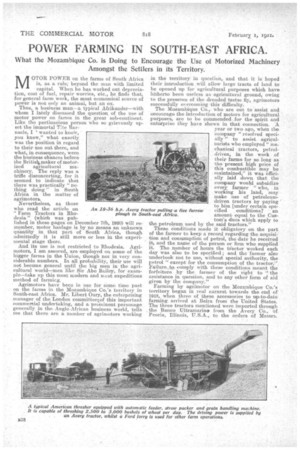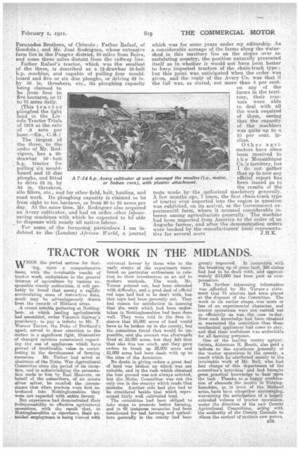POWER FARMING IN SOUTH-EAST AFRICA.
Page 20

Page 21

If you've noticed an error in this article please click here to report it so we can fix it.
What the Mozambique Co. is Doing to Encourage the Use of Motorized Machinery Amongst the Settlers in its Territory.
MOTOR POWER on the farms of South Africa is, as a rule, beyond the man with limited capital. Wheu he has worked out depreciation, cost of fuel, repair worries, etc., he. finds that, for general farm work, the most economical source of power is not only an animal, but an ox. Thus, a business man—a typical Afrilander—with whom I lately discussed the question of the use of Motor power on farms in the great sub-continent. Like the pertinacious person who So -grievously upset the immortal The, Barnacle, I ' wanted to know, you know," what exactly was the position in regard to their use out there, and what, in consequence, were the business chances before the Britis%maker of motorized agricultural machinery. The reply was a trifle disconcerting, for it seemed, to indicate that there was practically "nothing doing" in South Africa in. the matter of agrimotors. Nevertheless, as those who read the article on 'Farm Tractors in Rhodesia" (which was published in these pages on December 7th, 1920) will remember, motor haulage is by no means an unknown quantity in that part of South Africa though admittedly it is still more or less in the experimental stage there.
And its use is not restricted to Rhodesia. Agrimotors, I am assured,. are employed on some of the bigger farms in the Union, though not in very considerable numbers. In all probability, their use will not .become general until the big men in the agricultural world—men like Sir Abe Bailey, for example—take up this most modern and most expeditious method of farming.
Agrimotors have been in use for Some time past on the farms in the Mozambique Co.'s territory in South-east Africa. Mr. Libert Oury, the enterprising manager of the London committee,sof this important commertial undertaking, and a, prominent personage generally, in theAnglo-African business world, tells me that there are a number of agriniotors working
An 18-36 h.p. Avery Ira plough in Sou
in the territory in question, and that it is hoped their introduction will allow large tracts of land to be opened up for agricultural purposes which have hitherto been useless as 'agricultural ground, owing to the presence of the dreaded tsetse fly, agrimotors successfully overcoming this difficulty.
The Mozambique Co., who are out to assist and encourage the introduction of motors for Agricultural purposes, are to be conunended for the spirit and enterprise they have Shown in that connection. 'A year or two ago, when the company "resolved specially" to assist a-griculturists who employed" mechanical tractors, petroldriven, in the work of their farms for so -long as the present high price of this combustible may be maintained," it was officially laid down that the (company would subsidize every farmer "who, in working his land, may make use of petroleumdriven tractors by paying to him [under certain speL sifted conditions]' an amount equal to the Custom's dues which apply to the .petroleum used by thesaid tractors." These conditions made it Obligatory on, the part of the farmer to keep a record regarding the acquisition and consnmption of petrol, the date he received it, and the name ofthe person or firm who supplied it. The number of hours the tractor worked each day was also to be specified; and the farmer also -undertook not to use, without special authority, the petrol " except for the consumption of the tractor.' Failurento. comply with these conditions meant the forfeiture by the farmer of the right to 'f the assistance in question, and to any other form of aid given by the company."
Farming by agrimotor on the Mozambique. Co.'s territory began in real earnest towards the end of 1918, when three of these accessories to .up-to-date farming arrived at Beira from' the United States. The three tractors mentioned were imported through the Banco Ultramarine from the Avery CO., of Peoria, Illinois, U.S.A., to the orders of Messrs.
• dor pulling la five furrow th-east Africa. Fernandes Brothers, of Chimoia; Father Rafael, of Gondola; and Mr. Jose!. Rodrigues, whose extensive farm lies in the Pungwe district, 28 miles from Beira., and some three miles distant from the ralfway. line. Father Rafael's tractor, which was the smallest of the three, is described as a 12-drawbar 25-belt h.p. machine, and capable of pulling four mouldboard and five or six disc ploughs, or driving 22 in. by 36 in. threshers, etc., its ploughing capacity being claimed to be from four to ,five hectares, or 11 to 13 acres daily.
[This tractor ploughed the light land in the Lincoln Tractor Trials of 1919 at the rate of .9 acre per hour.—En., 0.16/1•1
The largest of the three, to the order of Mr. Rodrigues, has a 25drawbar 50 belt h.p. tractor for pulling six mouldboard and 12 disc
ploughs, and fitted A 7-14 h.p. Avery cultivator at to drive 32 in. by 54 in. threshers, silo fillers, etc., and for other field, belt, hauling, and road work. Its ploughing capacity is claimed to be from eight to ten hectares, or from 20 to 25 acres per day. At the same time, Mr. Rodrigues: also acquired an Avery cultivator, and had on order other laboursaving machines with which he expected to beable to dispense with nearly all native labour.
For some of the foregoing particulars I am indebted to the (London) African World, a journal
or Indian corn),
which was for some years under my editorship. As a considerable acreage of the farms along the watershed in this territory lies on the slopes over an undulating country, the position naturally presented itself as to whether it would not have been better to have imported. tractors of the chain-track type ; but this point was anticipated when the order was given, and the reply of the Avery Co. was that if. the fall was, as stated, not more than 8 per cent. on any of the farms in the territory, their tractors were able to deal with all the work required of them, seeing that the capacity of the machines was quite up to a Di per cent. incline.
Other agrimotors have since been received in the Mozambique Co.'s territory, but I do not gather that up to now any work amongst the mealles (i.e., maize. official report has
with planter attachment. been issued as to
_ the results of the tests made by the motorized machinery generally. A few months ago, I learn, the first chain-track type of tractor ever imported into the region in question was exhibited, on its arrival, at the Government experimentell farm, where it aroused considerable interest among agriculturists generally. The inaehine had been imported from America to the _order a an. Angoehe farmer, and after the demonstration orders were booked by the manufacturers' local-representa
tive for several more • J.H.K.




































